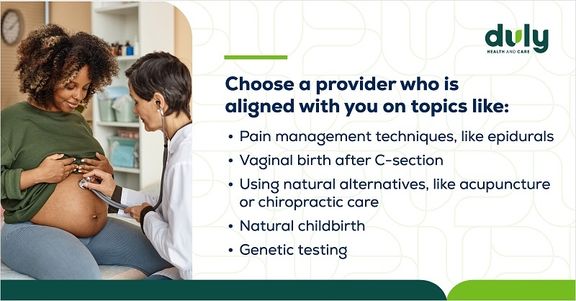It might be your first pregnancy, and you need an obstetrician. Or maybe it’s not your first, but you want to switch providers. You might even just be planning for the future and want to find one ahead of time.
Whatever the reason, you’re on the search for a new obstetrician.
Obstetricians (OBs) are physicians who specialize in delivering babies and providing care before and during pregnancy and the few weeks after childbirth. They’re different from gynecologists, who are physicians that focus on care for the entire female reproductive system. However, most OBs are also gynecologists, which is why you will often see providers referred to as OBGYNs.
Whether you’re already pregnant or hoping to conceive in the future, finding the right OBGYN is one of the first steps you can take to make sure you and your baby get the care you need.
So, how do you find the one that’s right for you?
Here are seven questions to ask when considering a new OBGYN:
1. Do they have experience with high-risk pregnancies?
Every pregnancy is different, and one of the most important things to look for in an OBGYN is someone who can meet your individual needs.
Some women benefit from seeing maternal-fetal medicine specialists (also known as “perinatologists”). These are providers who have specialized, advanced training in caring for women with high-risk pregnancies. You may be considered high-risk if you:
- Have an existing medical condition, like diabetes or high blood pressure
- Are carrying multiple babies at once (twins, triplets, etc.)
- Had complications during a previous pregnancy
- Know you will need to have a C‑section, or have had one in the past
- Smoke or have an alcohol or substance use disorder
Even if you don’t begin your pregnancy care with a maternal-fetal medicine specialist, your OBGYN may recommend working with one if you have complications during your pregnancy. For example, they may refer you to a specialist if you develop a condition like gestational diabetes (diabetes that occurs while pregnant) or preeclampsia (high blood pressure and high protein levels in your urine during pregnancy).
Also read: What to Expect at Your Pre-Natal Doctor’s Appointments
Whether or not you choose to work with an OBGYN who specializes in high-risk pregnancies, make sure that they are board-certified by the American Board of Obstetrics and Gynecology. Board certification shows that a provider meets a certain set of standards and is an expert in their field.
2. Are they in my insurance network?
Pregnancy can bring plenty of financial stress, so the last thing you need is surprise bills. If you are using insurance, confirm that your provider is in-network before making your first appointment. To avoid any mix-ups, check directly with both your provider and your insurance company to make sure everyone is on the same page.
Even with insurance, there may still be some costs to pay yourself. It’s critical not to let that stop you from getting the necessary care for you and your baby. If you are worried about money, check out financial aid options. Many hospitals and health systems offer payment plans where you can pay in smaller amounts over time.
3. Do we have the same beliefs and philosophies about pregnancy and childbirth?
Pregnancy care isn’t just about keeping you and your child healthy. It’s also about making sure that you are as emotionally and physically comfortable as possible.
As you look for an OBGYN, keep your personal preferences and beliefs in mind.

Being on the same page from the get-go can help avoid surprises and make you feel less worried or stressed during pregnancy.
Also read: Prenatal Genetic Testing Explained
4. Who will be delivering my baby?
Babies arrive on their own schedule, and it might not be the same schedule as your OBGYN’s.
Your OBGYN may be the one to deliver your baby, but it does depend on when your baby decides it’s time to make their debut. Many practices have a rotating schedule of OBGYNs who are on delivery “duty,” so it might be someone besides your own provider.
If this is the case for a practice you’re considering, find out if you’re able to meet the other OBGYNs ahead of time. This can make it much more comfortable and put you at ease when it’s time to go into labor, even if your OBGYN isn’t there.
5. Can they help with infertility?
Not being able to conceive right away is fairly common. While it can be exceptionally frustrating and emotionally challenging, there is good news if you’re struggling to get pregnant. Most people and couples facing infertility can eventually become pregnant. And while some lifestyle changes like losing weight or quitting smoking can help, the ability to conceive is often due to medical care.
Certain medications, treatments, or surgeries can improve your chances of getting pregnant.
When pregnancy is on your mind but you haven’t been able to conceive – or you have a medical condition that’s known to affect fertility – look for a provider who specializes in infertility care. If you decide that you want to try in vitro fertilization (IVF), your OBGYN may refer you to an IVF specialist.
6. What are others saying about them?
Still not sure who to choose? Hearing from others who worked with the OBGYNs you’re considering is a great way to learn about them on a more personal level. Reviewing websites, local social media groups, or simply texting a friend to ask who she used can help you find a trustworthy and well-liked provider. Hearing from others can also help you discover questions to ask or factors to consider that you hadn’t thought of before.
Just remember to take advice from others with a grain of salt, especially if you don’t know them well or can’t ask follow-up questions. Since everyone’s needs are different, a provider who didn’t jibe well with one woman might be perfect for you. It’s okay to let others’ opinions steer you in one direction or another, but at the end of the day, choosing the right OBGYN is all about your own personal preferences.
7. What is my gut saying?
Even if an OBGYN checks all the boxes and has great reviews, they still might not be the right fit. Sometimes, it simply comes down to whether or not your personalities mesh. When you first meet a provider, make sure you feel like you can speak openly with them, that they clearly explain everything, and that they make time for you. You will be seeing them a lot during your pregnancy, so it’s important that you have a good relationship with them.
Go with your instincts and choose an OBGYN who makes you feel comfortable and safe and who you trust to keep you and your baby healthy.
At Duly Health and Care, our OBGYNs and their care teams provide personalized, compassionate care tailored to your unique needs. Our commitment is to be with you every step (and kick) of the way, offering convenient OBGYN appointment times and bilingual services to ensure you receive the highest standard of care. Find an OBGYN and make an appointment online at Duly Health and Care.
Health Topics:





